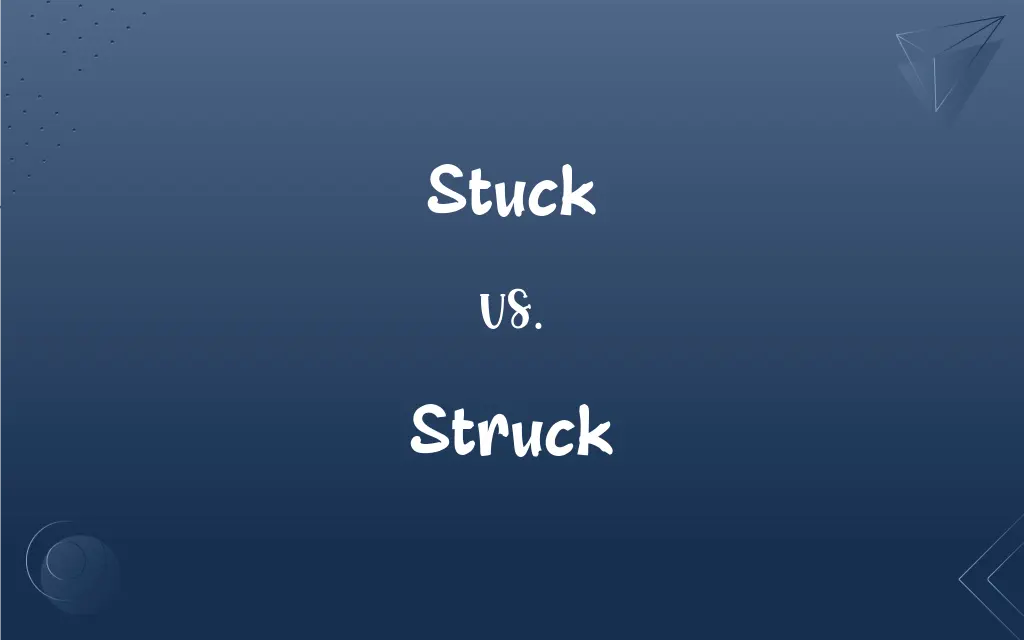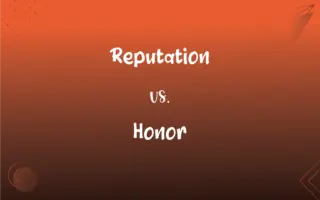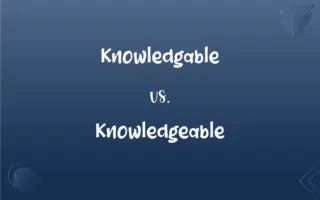Stuck vs. Struck: What's the Difference?
Edited by Aimie Carlson || By Janet White || Updated on October 11, 2023
"Stuck" is the past participle of "stick" and often refers to being in a fixed position, while "struck" is the past tense of "strike" and means to hit or impact something.

Key Differences
"Stuck" primarily serves as the past participle of the verb "stick". It can describe something that has adhered to another object or a situation in which movement is restricted. For example, a piece of tape that adheres to a surface is "stuck", or a person unable to leave a room might say they are "stuck".
In contrast, "struck" is the simple past tense and past participle of the verb "strike". It relates to the act of hitting, impacting, or coming into sudden contact with something. For instance, if someone hits a drum, they have "struck" it, or lightning may have "struck" a tree.
"Stuck" can also portray being in an undesirable situation or a difficult position from which it's hard to extricate oneself. Someone might feel "stuck" in a boring job, suggesting they feel trapped or unfulfilled by their current occupation.
Conversely, "struck" can convey the idea of being profoundly affected or impressed by something. Someone can be "struck" by a brilliant idea or "struck" by the beauty of a sunset, indicating a deep emotional or cognitive response.
In essence, while both "stuck" and "struck" deal with interactions, "stuck" often denotes a static condition or situation, while "struck" highlights an action or a strong reaction to something.
ADVERTISEMENT
Comparison Chart
Grammatical Form
Past participle of "stick"
Past tense and past participle of "strike"
Typical Usage
Describes being in a fixed position
Describes the act of hitting
Emotional Connotation
Feeling trapped or restricted
Being profoundly affected or impressed
Situational Context
Being unable to move or progress
A sudden or impactful event
Nature
Static or restrictive condition
Dynamic action or deep reaction
ADVERTISEMENT
Stuck and Struck Definitions
Stuck
In a difficult or problematic situation.
She felt stuck in her current job and yearned for a change.
Struck
Hit or impacted forcefully.
The ball struck the window.
Stuck
Adhered to a surface or object.
The label stuck to the box.
Struck
Affected or impressed deeply.
I was struck by his eloquence during the speech.
Stuck
Puzzled or uncertain about something.
I'm stuck on this math problem and need some help.
Struck
Created an impression or effect.
The news struck fear into everyone's hearts.
Stuck
Past tense and past participle of stick.
Struck
Chose or adopted a particular method or approach.
He struck a deal with the competitor.
Stuck
Unable to move.
Can you shift this gate? I think it’s stuck.
If you’ve had to battle a stuck zipper, you know how frustrating it can be.
Struck
Came into sudden contact.
Her head struck the door as she entered.
Stuck
Unable to progress with a task.
I’m totally stuck on this question in the test.
Struck
Past tense and a past participle of strike.
Stuck
Unable to progress or develop.
The negotiations were stuck due to disagreements.
Struck
Simple past tense and past participle of strike
Stuck
No longer functioning, frozen up, frozen.
There are several ways to close a stuck program.
Struck
Affected or shut down by a labor strike.
Stuck
In the situation of having no money.
Struck
(used in combination) affected by something overwhelming;
Conscience-smitten
Awe-struck
Stuck
(obsolete) A thrust.
Stuck
A thrust.
Stuck
Caught or fixed;
Stuck in the mud
Stuck
Baffled;
This problem has me completely stuck
Stuck
Unable to move or be moved.
The car's wheels were stuck in the mud.
FAQs
Can "stuck" refer to emotional situations?
Yes, someone can feel "stuck" in a relationship or job, indicating dissatisfaction.
What does "stuck" commonly imply?
"Stuck" often suggests being in a fixed or unmovable position or situation.
Is "stuck" always negative?
Not always, context is key. For instance, "stuck" can simply mean adhered to a surface.
How does "struck gold" relate to the word "struck"?
"Struck gold" is an idiom meaning someone has found or discovered something valuable or beneficial.
Can "stuck" indicate a temporary condition?
Yes, someone might be "stuck" in traffic, implying a temporary delay.
What does it mean when someone is "struck" by beauty?
It means they're deeply impressed or affected by the beauty they witnessed.
What does "struck out" mean in baseball?
It means the batter received three strikes and is out for that turn.
What does "struck a chord" mean?
It's an idiom meaning something resonated or had a meaningful impact on someone.
How is "struck" typically used in a sentence?
"Struck" describes the act of hitting or being deeply affected by something.
Is "struck down" a legal term?
Yes, it means to invalidate or nullify, often used in the context of laws or regulations.
Can "stuck" describe a feeling of confusion?
Yes, if someone doesn't understand something, they might say they're "stuck".
Can "stuck" refer to objects?
Yes, like when a piece of paper is "stuck" to a wall with tape.
Is "struck" used in music terminology?
Yes, when you hit a musical instrument, like a drum or piano key, it's "struck".
Is "being stuck" always permanent?
No, "being stuck" can be temporary or long-term, depending on the context.
What's the difference between "stuck on" and "struck on"?
"Stuck on" can mean fixated or adhered to something, while "struck on" isn't a common phrase.
How is "struck" used in the context of a clock?
A clock "strikes" an hour when it sounds the hour with chimes or bells.
Can "struck" refer to inspiration?
Yes, someone can be "struck" with a brilliant idea.
Can "stuck" refer to an inability to think?
Yes, someone might say they're "stuck" when they can't think of an answer.
About Author
Written by
Janet WhiteJanet White has been an esteemed writer and blogger for Difference Wiki. Holding a Master's degree in Science and Medical Journalism from the prestigious Boston University, she has consistently demonstrated her expertise and passion for her field. When she's not immersed in her work, Janet relishes her time exercising, delving into a good book, and cherishing moments with friends and family.
Edited by
Aimie CarlsonAimie Carlson, holding a master's degree in English literature, is a fervent English language enthusiast. She lends her writing talents to Difference Wiki, a prominent website that specializes in comparisons, offering readers insightful analyses that both captivate and inform.































































